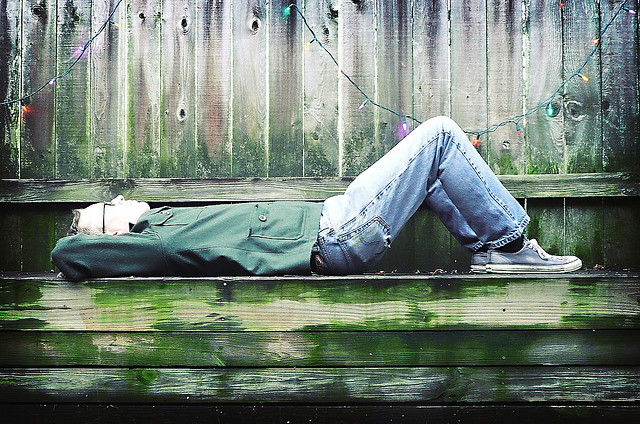
“Beware the barrenness of a busy life.” ~Socrates
Last night, I was telling my husband that I had spent several hours teaching myself the very basics of HTML code in order to edit my blog’s layout precisely according to my vision for it.
I had actually enjoyed the time I spent on this puzzle, but nevertheless commented to him that I couldn’t help but resent wasting some of my day off clicking away in front of the computer screen.
“Why?” he asked. “You enjoyed it, right?”
Yes, I replied, it was fun delve into something new, and fascinating to glimpse the buried inner workings of the virtual world, but still….
“Right, so you spent some time in the flow, working on something and losing track of time, and now you know a little bit more about how the world works than you did before. How can that possibly be wasted time?”
How true. I had wanted even my day off to be productively idle, to serve some function, even if that function was pure relaxation. But I actually felt more fulfilled by doing something new, something I never would have expected to become interested in.
Not only did I have the idle time to delve into this, but I allowed myself to use that idle time in that particular way—to float off into exploration until before I knew it, I had been reading forums and scrolling through code for three hours.
When I realized this, my first impulse was to think of it as something negative—wasted time! But was it really?
As I thought about our conversation, it occurred to me: Too often, I am far too acutely aware of time. Am I using it wisely? Am I being efficient? Getting adequate work done?
Structuring my day so that I can fit in work, exercise, writing, chores, and maybe even the not-so-occasional episode of Dexter.
There is certainly something to be said for routine. I love feeling that at the end of the day, I have done things for myself, as well as accomplished what was needed professionally, and hopefully worked in some time with friends and family.
And the only way to do that, usually, is by rigorously structuring and sticking to a routine.
But in this rigid adherence to routine, necessitated by busyness, do we risk cutting off access to the meandering flow of the mind—to unexpected discovery and the pleasure that comes from losing time completely in an unanticipated task?
There are several ways to start with the end in mind—temporally (I will be done working on this at five o’clock!), intellectually (I can’t spend time learning HTML—I already know I’m not capable of understanding that), or emotionally (I already know how I feel about that).
If we do this, our lives truly will be barren. There will be no room for spontaneity, learning, and surprise.
No room for defying expectations, for exploring with no preconceived purpose, and therefore, ending up somewhere completely unexpected.
I love to set and meet goals, and in this way I suspect I’m a fairly representative member of our culture.
We all desire to have full, meaningful lives, but how often does our definition of meaningful hinge on the recognition or perception of others?
I admire those people who seem able to do it all and still maintain balance, and I often think, “If only I were a little more focused, or used my time more wisely or efficiently, maybe I could be like that!”
But the truth is, while that might expand my resume or diversify my list of career accomplishments, it will do little to make me happy, and holds slim opportunity for the pleasure of discovery.
One of the great gifts of writing—and, though I don’t have much experience in other areas, I imagine this is true of most forms of art-making—is that it is not a linear process. Too much structure and focus on the end goal will, at least for me, derail the entire creative act.
Writing cultivates flowing, associative thought, the loss of time, and the spontaneous yet concentrated creation of something from nothing.
I have general writing goals, and I certainly have to impose discipline on myself to make room for writing in my day, but the generative process itself blessedly un-goal-oriented.
Goals and outcomes are all well and good for strategic planning, career paths, and athletic feats.
But to similarly structure every aspect of life is to lose the art of it. We lose those moments when we might be most open and most ourselves, capable of discovery through examined contemplation and the flexibility to allow life to unfold as it will.
It is the relaxation of control, the total lack of ambition for this moment, the permission for the mind to wander its path that fends off the barrenness of routine.
And so I will continue to make time for it, to schedule in my spontaneity, if I must, and think of such time not as wasted, but as the most precious I have.
Photo by madmolecule
About Tory Syracuse
Tory Syracuse works, writes and plays in Tucson, Arizona. You can read more of her work at http://tucsonporchswing.blogspot.com.













 Though I run this site, it is not mine. It's ours. It's not about me. It's about us. Your stories and your wisdom are just as meaningful as mine.
Though I run this site, it is not mine. It's ours. It's not about me. It's about us. Your stories and your wisdom are just as meaningful as mine.
Thanks for sharing your experience Tory (:
As I think of it, time is such a wonderful piece of instrument. You can bend it to your purpose. You can use it for things you love or behind crying and ranting behind things you don’t. In fact, our every down time with that ‘wasted’ feeling is the real waste of time. If you are having fun, you can’t say you wasted the time.
This is so awesome…I love it! Your writing is great…you get the point across…and you made me feel better about myself…I truly enjoy “losing time” as it were and I am tired of the guilt associated with it in our society…
Thanks for reading, Kim!
wow, I just have to say, I really enjoyed this. It spoke to me in a very meaningful way. Thank you!
You’re welcome, Alex! Thanks for reading.
Love this reminder that no time is wasted. I often create a mental list of the day’s accomplishments, noting time spent on tasks. When I realize I spent an hour reading a magazine or strolling in a shop, I can chastise myself for wasting time. Yet, I have not wasted time, but enjoyed myself and allowed myself the fun of play and drift. Mental drift is so important for creativity. Thanks for a great article!
I love the concept of “mental drift,” Klalota – and find all to often that when something is considered “play” it is expendable or undervalued, when really, it’s the source of such much creativity and pleasure. I appreciate your comment!
I know too well the idea of “wasting time.” Honestly, we should cherish the moments when time flies by and we lose track of it. After all, time is an illusion any way. Why live our lives serving a made-up concept?
I couldn’t agree more, Fred! Thanks for reading.
[…] The following is a re-post of an article written by Tory Syracuse and posted at TinyBuddha.com. The only thing I’ve changed is the photo — wanted to put […]
I plan my life in such a way that it maximizes serendipitous discovery; in a way I try to “waste” time as much as possible to make the most of it!
I don’t waste time anymore even when I’m investing time in the morning to sit quietly with my thoughts or in the evening when I relax before bedtime, or any time during the day. If what I invest my time is has meaning for me it is value added to my life.
I couldn’t agree more. Thanks for reading!
“Time you enjoyed wasting is not wasted time.” T. S. Eliot
Lovely; thank you!
[…] In Defense of Wasting Time | Tiny Buddha: Wisdom Quotes, Letting … […]
I had this very same issue. I would spend hours whiling away the day on making movies or organizing photos and to what end? Well it felt somewhat a waste of time but as you quite rightly mention here it is not a waste of time at all. I had massive amounts if fun and am proud of my accomplishments and photo collections. I developed new skills, all of which can be passed on and taught to others, which I also love doing. So, do what you enjoy and don’t think that you haven’t achieved anything just because it wasn’t on your todo list!
[…] 23. Immerse yourself in learning something new and allow yourself to forget about the limitations of time. […]
I’ll be extremely surprised and impressed if you no longer see “clicking away in front of the computer screen” as “wasting some of my day”.
Much like saying “I have no life”, it is not inherently a bad thing, it simply means I have no [social] life at the moment. I do IT work for a living. It’s all virtual and I see a lot of it as a waste of time. I’m not sure I will ever be able to change this, it simply doesn’t have the widely accepted, social element to it.
wasted time is the most i remember at the end of the day!
I am so into this post, this is the thing had been going deep in my head since months. Its something like self-awakening kind of thing. I loved every word/thought of this post.
Thank you for reading, and for the comment!
I have been thinking about this issue in my own life lately, thanks for putting it so clearly into words Tory!
You’re welcome, Grace. Thank you for reading!
Thanks for this essay Tory! You would enjoy reading an essay by Robert Louis Stevenson entitled ‘AN APOLOGY FOR IDLERS’ published in 1877. It speaks directly to having the time for discovery, and is richly insightful! I could email it to you. Tweet me if you like, @R_Serling_Rules. I am a former long-term Tucsonan.
Thanks so much for the reference – I’ll look it up! It’s always nice to hear from fellow (even if former) Tucsonans. Cheers!
possibly to send a copy or a link to me by mail, sorry no twitter account
thomas
hi,
“not wasting” = -?-
saving maybe ? for what ? later ?
Like in Michael Ende’s Book “Momo” maybe ?
Just a quick and dirty comment, i am going to read the article and comments, think about it and might come back with a better comment.
No time, hurry, i have to save my time, … what a waste …
😉
thomas
Have a read of Bertrand Russell’s essay ‘In Praise of Idleness’ http://www.zpub.com/notes/idle.html
He argues the case with typical eloquence.
Thank you! I’ll read it tonight! 🙂
[…] other day, Tory Syracuse’s article on the benefits of wasting time really touched me, beginning with the pithy quote from Socrates: “Beware the barrenness of a busy […]
[…] your potential as a leader. 23. Immerse yourself in learning something new and allow yourself to forget about the limitations of time. 24. Write a bucket list of all the things you’d like to do in your lifetime. 25. Create a vision […]
“…I will continue to make time for it, to schedule in my spontaneity,…”. Hmmmm..sort of losing the spontaneity when you schedule it…no? I also find myself making use of every single minute in my effort to lead a “productive” and happy life. Sometimes however when I find my self sitting quietly, suddenly discovering that the last hour (or two or three!) has passed and I realize I did nothing but read, contemplate, watch, or experience something unplanned, I discover that I am happiest, and possibly the most productive I have been all day! Sort of an oxymoron I suppose, like having to schedule spontaneity! A great article and a great concept that we all must keep in mind.